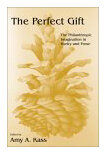The Perfect Gift: The Philanthropic Imagination in Poetry and Prose
What motivates us to give? The Perfect Gift: The Philanthropic Imagination in Poetry and Prose asks readers to ponder this question and many more. This anthology offers a tapestry of works that challenges each of us to think about the nature of generosity. The texts encourage reflection and rigorous introspection while acknowledging that there are no clear, definitive answers.
Divided into five parts — "Why Should I Give?", "How Should I Give?", "To Whom or for What Should I Give?", "What Should I Give?", and "Can Giving Be Taught?" — The Perfect Gift comprises Bible stories, commentary, short stories, essays, and poems from writers as varied as William Shakespeare, Aristotle, Dorothy Parker, O. Henry, and Edith Wharton. The strength of this work lies in the diversity of genres represented.
The Perfect Gift asks if you are emotionally prepared to be a charitable donor despite the potential for difficulty or awkwardness, and it stresses the need for extreme clarity about the very definition of "helping." In "Charitable Effort," for example, Jane Addams criticizes philanthropy based on the idea that "only the 'worthy poor' are to be helped." Another challenge, according to Clifford Orwin's "Princess Diana and Mother Teresa," is that charity is often delivered de haut en bas, or from top to bottom, a structure that "affronts the dignity of the recipient and thereby our own egalitarianism."
If nothing else, this anthology forces you to examine your own opinions, ethics, and actions in the process of helping others. Although the majority of the works included reflect editor Amy A. Kass' background as a professor of the humanities, with a focus on classical literature and philosophy, she does manage to juxtapose the words of those you'd expect to find here, such as Alexis de Tocqueville and Andrew Carnegie, with a suitable selection of modern writers, among them Barry Schwartz and Clifford Orwin. But while the variety of eras represented by the writers adds to the texture of the collection, it would be enhanced even more by the inclusion of more women writers and writers of color. The absence of these voices inadvertently reinforces the idea that philanthropy is the sole province of the more culturally and economically privileged members of society.
In today's climate of cutbacks, layoffs, and world strife, it is refreshing to read a work that asks you to continue giving in the face of the many obstacles to charitable conduct. The Perfect Gift is not intended to provide answers to the questions presented in Kass' chapter titles; rather, its lesson is that it is incumbent upon each one of us to find those answers within ourselves and with one another.







